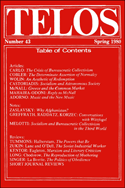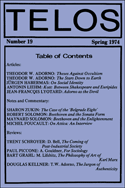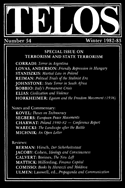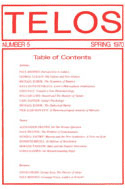By Yonathan Listik · Tuesday, April 23, 2013
As an occasional feature on TELOSscope, we highlight a past Telos article whose critical insights continue to illuminate our thinking and challenge our assumptions. Today, Yonathan Listik looks at Cornelius Castoriadis’s “Socialism and Autonomous Society,” from Telos 43 (Spring 1980).
 Cornelius Castoriadis’s opening line in “Socialism and Autonomous Society”—”Henceforth, the terms ‘socialism’ and ‘communism’ will have to be abandoned”—clearly indicate that he is breaking with orthodox Marxism. But one must not rush to a conclusion since upon closer inspection the dissonances are not that relevant to Marx’s overall project as presented by Castoriadis. His criticism of notions such as the “dictatorship of the proletariat” could automatically place him outside the Marxist discourse. Nevertheless he manages to illustrate, even within orthodox Marxism, the minor position of canonical notions, compared to Marx’s essential project of an autonomous society: a society composed of free and sovereign people. Cornelius Castoriadis’s opening line in “Socialism and Autonomous Society”—”Henceforth, the terms ‘socialism’ and ‘communism’ will have to be abandoned”—clearly indicate that he is breaking with orthodox Marxism. But one must not rush to a conclusion since upon closer inspection the dissonances are not that relevant to Marx’s overall project as presented by Castoriadis. His criticism of notions such as the “dictatorship of the proletariat” could automatically place him outside the Marxist discourse. Nevertheless he manages to illustrate, even within orthodox Marxism, the minor position of canonical notions, compared to Marx’s essential project of an autonomous society: a society composed of free and sovereign people.
Continue reading →
By Yonathan Listik · Tuesday, March 12, 2013
As an occasional feature on TELOSscope, we highlight a past Telos article whose critical insights continue to illuminate our thinking and challenge our assumptions. Today, Yonathan Listik looks at Jürgen Habermas’s “On Social Identity,” from Telos 19 (Spring 1974).
 Jürgen Habermas’s objective in “On Social Identity” is clearly defending the usage of instrumental rationality toward the development of a universal morality. For Habermas, the new social identity should be constructed through universalistic moral systems, thereby eliminating possible frictions or incoherence present in modern society. The obsolescence of the state and its replacement by autonomous means of identity construction, such as art, already point to his emphasis on a more particular form of identity construction. Jürgen Habermas’s objective in “On Social Identity” is clearly defending the usage of instrumental rationality toward the development of a universal morality. For Habermas, the new social identity should be constructed through universalistic moral systems, thereby eliminating possible frictions or incoherence present in modern society. The obsolescence of the state and its replacement by autonomous means of identity construction, such as art, already point to his emphasis on a more particular form of identity construction.
Continue reading →
By Yonathan Listik · Tuesday, January 29, 2013 As an occasional feature on TELOSscope, we highlight a past Telos article whose critical insights continue to illuminate our thinking and challenge our assumptions. Today, Yonathan Listik looks Norbert Elias’s “Civilization and Violence: On the State Monopoly of Physical Violence and its Infringements,” from Telos 54 (Winter 1982).
 Norbert Elias’s argument in “Civilization and Violence: On the State Monopoly of Physical Violence and its Infringements” is especially helpful for understanding the developments of terrorism, and it also applies to contemporary phenomena such as the war on drugs. He contends that placing the monopoly of violence in the hands of the state comes from a desire of harmonization. The assumption is that stability depends on an imposed self-discipline. That is, the state represents the interests of the collective and should provide for it. This is very enlightening considering the assumptions in the “war on drugs.” Norbert Elias’s argument in “Civilization and Violence: On the State Monopoly of Physical Violence and its Infringements” is especially helpful for understanding the developments of terrorism, and it also applies to contemporary phenomena such as the war on drugs. He contends that placing the monopoly of violence in the hands of the state comes from a desire of harmonization. The assumption is that stability depends on an imposed self-discipline. That is, the state represents the interests of the collective and should provide for it. This is very enlightening considering the assumptions in the “war on drugs.”
Continue reading →
By Yonathan Listik · Tuesday, November 27, 2012 As an occasional feature on TELOSscope, we highlight a past Telos article whose critical insights continue to illuminate our thinking and challenge our assumptions. Today, Yonathan Listik looks at Georg Lukács’s “The Old Culture and the New Culture” from Telos 5 (Spring 1970).
 It would be simplistic to argue that behind the Marxist critiques of capitalist society there was only an objective intention simply to improve its effectiveness and avoid the political complications found in capitalist society. Despite its strict scientific tone, Marxism still carries a heavily moral intention. This is what Georg Lukács comes to argue in this essay on culture. In his analysis of capitalist cultural structure and its many differences from capitalist reality, Lukács points to what he regards as the ultimate goal behind communism: a new cultural order. It would be simplistic to argue that behind the Marxist critiques of capitalist society there was only an objective intention simply to improve its effectiveness and avoid the political complications found in capitalist society. Despite its strict scientific tone, Marxism still carries a heavily moral intention. This is what Georg Lukács comes to argue in this essay on culture. In his analysis of capitalist cultural structure and its many differences from capitalist reality, Lukács points to what he regards as the ultimate goal behind communism: a new cultural order.
Continue reading →
|
|
 Cornelius Castoriadis’s opening line in “Socialism and Autonomous Society”—”Henceforth, the terms ‘socialism’ and ‘communism’ will have to be abandoned”—clearly indicate that he is breaking with orthodox Marxism. But one must not rush to a conclusion since upon closer inspection the dissonances are not that relevant to Marx’s overall project as presented by Castoriadis. His criticism of notions such as the “dictatorship of the proletariat” could automatically place him outside the Marxist discourse. Nevertheless he manages to illustrate, even within orthodox Marxism, the minor position of canonical notions, compared to Marx’s essential project of an autonomous society: a society composed of free and sovereign people.
Cornelius Castoriadis’s opening line in “Socialism and Autonomous Society”—”Henceforth, the terms ‘socialism’ and ‘communism’ will have to be abandoned”—clearly indicate that he is breaking with orthodox Marxism. But one must not rush to a conclusion since upon closer inspection the dissonances are not that relevant to Marx’s overall project as presented by Castoriadis. His criticism of notions such as the “dictatorship of the proletariat” could automatically place him outside the Marxist discourse. Nevertheless he manages to illustrate, even within orthodox Marxism, the minor position of canonical notions, compared to Marx’s essential project of an autonomous society: a society composed of free and sovereign people.  Jürgen Habermas’s objective in “On Social Identity” is clearly defending the usage of instrumental rationality toward the development of a universal morality. For Habermas, the new social identity should be constructed through universalistic moral systems, thereby eliminating possible frictions or incoherence present in modern society. The obsolescence of the state and its replacement by autonomous means of identity construction, such as art, already point to his emphasis on a more particular form of identity construction.
Jürgen Habermas’s objective in “On Social Identity” is clearly defending the usage of instrumental rationality toward the development of a universal morality. For Habermas, the new social identity should be constructed through universalistic moral systems, thereby eliminating possible frictions or incoherence present in modern society. The obsolescence of the state and its replacement by autonomous means of identity construction, such as art, already point to his emphasis on a more particular form of identity construction.  Norbert Elias’s argument in “Civilization and Violence: On the State Monopoly of Physical Violence and its Infringements” is especially helpful for understanding the developments of terrorism, and it also applies to contemporary phenomena such as the war on drugs. He contends that placing the monopoly of violence in the hands of the state comes from a desire of harmonization. The assumption is that stability depends on an imposed self-discipline. That is, the state represents the interests of the collective and should provide for it. This is very enlightening considering the assumptions in the “war on drugs.”
Norbert Elias’s argument in “Civilization and Violence: On the State Monopoly of Physical Violence and its Infringements” is especially helpful for understanding the developments of terrorism, and it also applies to contemporary phenomena such as the war on drugs. He contends that placing the monopoly of violence in the hands of the state comes from a desire of harmonization. The assumption is that stability depends on an imposed self-discipline. That is, the state represents the interests of the collective and should provide for it. This is very enlightening considering the assumptions in the “war on drugs.”  It would be simplistic to argue that behind the Marxist critiques of capitalist society there was only an objective intention simply to improve its effectiveness and avoid the political complications found in capitalist society. Despite its strict scientific tone, Marxism still carries a heavily moral intention. This is what Georg Lukács comes to argue in this essay on culture. In his analysis of capitalist cultural structure and its many differences from capitalist reality, Lukács points to what he regards as the ultimate goal behind communism: a new cultural order.
It would be simplistic to argue that behind the Marxist critiques of capitalist society there was only an objective intention simply to improve its effectiveness and avoid the political complications found in capitalist society. Despite its strict scientific tone, Marxism still carries a heavily moral intention. This is what Georg Lukács comes to argue in this essay on culture. In his analysis of capitalist cultural structure and its many differences from capitalist reality, Lukács points to what he regards as the ultimate goal behind communism: a new cultural order. 

